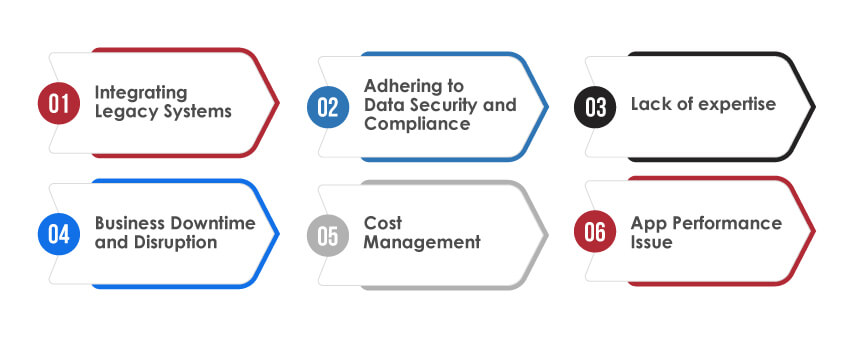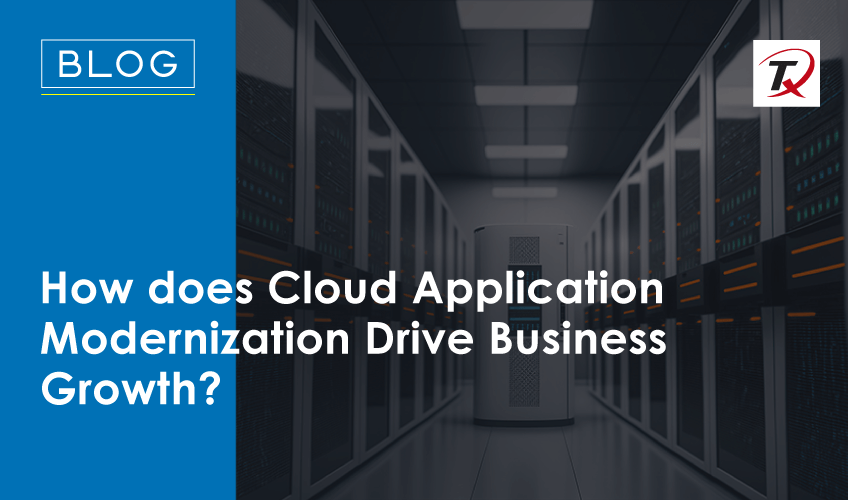Table of Contents
- What is Cloud Application Modernization?
- Why do Businesses Need Cloud App Modernization?
- Challenges and Solutions in Cloud App Modernization
- How to Measure the Success of Cloud Application Modernization?
- Summary
- Why Partner with TestingXperts for Cloud App Modernization?
In today’s dynamic digital business environment, businesses should innovate quickly while facing the challenges of economic change and evolving tech innovations. They know how important modernizing applications are. However, selecting the right approach, identifying the right time, and implementing strategies to unlock maximum ROI from an initiative is difficult. Also, maintaining an outdated on-premises tech infrastructure is no longer the right approach. Businesses need a more flexible, adaptable, customizable, and scalable solution. This is where cloud application modernization comes to play.
End-user spending on public cloud services is expected to reach $678.8 billion worldwide by the end of 2025. Based on cloud technologies’ role in flexibility, enchanted performance, and data accessibility in modern-day businesses, it is no surprise that companies will be investing in this technology. The application modernization service market alone is expected to reach $32.8 billion by 2027. The shift towards platform-as-a-service signifies businesses seeking cost-effective, flexible, and scalable solutions to stay agile and competitive.
What is Cloud Application Modernization?
Cloud application modernization is the process of transforming existing apps or building new ones and then running them on the cloud-first model to align with business requirements. It is one of the essential steps when businesses plan their digital transformation strategy to optimize operations and improve ROI. This practice is also known as legacy modernization, which enables businesses to reap the benefits of tech innovations while modernizing legacy applications.
Some businesses tend to retire their outdated app infrastructure and adopt the latest one, which is a costly process from an operational and financial standpoint. This is why cloud app modernization is the most reliable and efficient way to utilize modern platforms, frameworks, and tools. There are several aspects related to it:
• Re-platforming – It involves moving applications to a cloud platform with minimal changes.
• Refactoring – It involves altering the application’s code to sync with the cloud environment.
• Re-architecting – It involves redesigning applications to fit a cloud-native environment and reap its full benefits.
The transition to the cloud enhances the app’s overall functionality and performance by leveraging its scalability and flexibility. It also ensures that the migrated apps seamlessly sync with other systems and services, which is necessary for achieving digital transformation across an organization. Also, cloud-based apps are easy to update, have improved security measures, and enable businesses to be more agile to adapt to changing market and customer needs. The cloud app modernization process can be complex and time-consuming. Still, in the long run, it’s a good investment for businesses that want to stay competitive in an overcrowded marketplace.
Why do Businesses Need Cloud App Modernization?
Cloud app modernization is key for businesses to stay ahead in the rapidly changing digital environment. Technology evolves daily, and maintaining old software systems is becoming costly and increasingly unsustainable. These systems often cannot integrate with new technologies, affecting a business’s ability to grow and adapt. Let’s take a look at some of the primary reasons why cloud application modernization is important for businesses:
• It helps reduce operational costs spent on maintaining and supporting legacy systems. Cloud apps streamline business processes, resulting in lower IT spending.
• It enables businesses to adjust their resources based on current operational needs. Handling workload efficiently leads to effective budget and resource allocation, resulting in positive ROI.
• Modern cloud applications have robust security features to reduce potential costs and risks related to data breaches. It allows businesses to protect their financial and reputational standing.
• Modernization brings tools and technologies that enhance overall business productivity. It enables efficient and faster workflows to utilize better time and resources, which are key contributors to ROI.
• It enables quicker deployment of new software products and services. Businesses can implement innovations better, leading to improved market positioning and revenue gains.
• It has advanced data analytics and processing capabilities. It supports informed decision-making as it directly affects ROI and profitability.
• It improves customer experience by modernizing applications, thus increasing customer loyalty and satisfaction. This helps in long-term business revenue growth.
• Cloud modernization allows businesses to allocate resources more effectively to avoid underutilization or overexertion of their IT infrastructure.
Challenges and Solutions in Cloud App Modernization

Cloud app modernization is one of the crucial steps in a digital transformation process. However, the process has its challenges that businesses should know and how to tackle them. It will help in a successful transition to modern, cloud-based applications. Let’s take a look at the cloud app modernization challenges and their solutions:
Integrating Legacy Systems:
Many businesses face difficulties integrating legacy systems with modern cloud applications. These systems have become outdated and don’t sync well with modern cloud architecture. Businesses can facilitate connections between new and old systems by implementing middleware solutions or APIs. Also, having a phased integration strategy can help manage the transition more smoothly.
Adhering to Data Security and Compliance:
Businesses often have data security and compliance concerns with various regulations when moving to the cloud. Partner with cloud services providers who have robust security measures and compliance certifications. It will help implement an additional layer of security, and you don’t have to worry about regularly updating security protocols. It will be handled by the cloud service provider itself.
Lack of expertise:
Lack of in-house experience in modern cloud technologies is another obstacle in the modernization process. Businesses should invest in training programs to educate staff about the required skills to bridge this gap. They can also partner with a professional cloud solution provider to outsource cloud app management.
Business Downtime and Disruption:
Cloud migration sometimes causes operational disruptions and downtime, affecting business continuity. Having a comprehensive migration plan, including rollouts and thorough testing, would help in preventing this challenge. Using cloud migration tools to support seamless transition would help minimize disruption.
Cost Management:
The cost of cloud app modernization would be high if there isn’t proper planning. It will disrupt the business budget, affecting ROI negatively. One must conduct a thorough cost-benefit analysis before transition. Choose a cloud service model that aligns with business needs and budget. Conduct regular cloud resource monitoring and optimization to manage costs effectively.
App Performance Issue:
It is important to ensure optimal app performance post-migration, which is challenging. Sometimes, introducing new functionalities creates performance disruption, affecting the application’s overall UX. Regular performance monitoring and optimization processes should be conducted post-migration. Deploy auto-scaling and load-balancing features to maintain optimal performance.
How to Measure the Success of Cloud Application Modernization?

Measuring how cloud application modernization success would impact business operations, efficiency, and overall ROI is important. It demonstrates the value gained after modernization and guides future IT strategies. By monitoring specific metrics and KPIs, businesses can measure the benefits of the modernization project and identify areas that require improvement:
Performance Improvements:
One primary goal of cloud app modernization is to optimize performance. It is measured by tracking load times, system uptime, and application response time. Faster response time and downtime reduction are indicators of success.
Cost Savings:
Compare TCO (total cost of ownership) before and after modernization. It consists of costs associated with infrastructure, operations, and maintenance. Reduction in these factors post-modernization results in a positive impact on business financial growth.
Scalability and Flexibility:
Analyze how well a modernized application syncs with business requirements. Successful modernization will improve scalability, and businesses can handle increased workloads without performance issues.
Security Improvement:
Evaluate security protocols before and after modernization. Improvement in security leads to reduced cyberattacks and data breaches, which clearly indicates successful modernization.
CX Enhancement:
Regularly monitor customer feedback and satisfaction levels. Metrics such as user engagement and satisfaction score improvement highlight the CX level, which is crucial in modernization.
Operational Efficiency:
Measures the impact on internal operations, such as the time to deploy new features or updates. Operational efficiency improvement would lead to better productivity and quicker time-to-market.
Cloud Resource Utilization:
Optimized storage, computing power, and reduced errors signify the effective use of cloud resources post-modernization. Also, ensure that modernized apps comply with regulatory standards and compliances. Ensuring compliance is necessary for highly regulated industries like healthcare and insurance.
Summary
Cloud application modernization is necessary for businesses to remain competitive in the digital era. Its benefits include increased efficiency, enhanced security, and scalability, which positively affect the ROI. The process also has some challenges, but with strategic planning and best practices, businesses can successfully implement the modernization process. It is necessary for companies that want agility, innovation, and long-term business success. However, to do so, one must partner with a professional cloud testing provider who can assist with the modernization project. It is necessary to harness the full potential of cloud technologies and remain competitive.
Why Partner with TestingXperts for Cloud App Modernization?
Partnering with Tx for cloud testing services will ensure you with high quality and performance during and after cloud application modernization. With our robust and reliable cloud-specific testing services, like performance testing, load testing, and stress testing, you can ensure your application can handle cloud infrastructure demands. Partnering with us will offer you following benefits:
• Our experts have deep knowledge of complexities related to application modernization. The team is skilled in testing applications for scalability, performance, and compatibility with cloud environments.
• We provide customized testing solutions to ensure your apps perform optimally in the new cloud environment.
• We use advanced tools and in-house accelerators to test critical aspects of cloud applications, such as load testing, integration testing, etc.
• Our experts have experience addressing security vulnerabilities specific to cloud-based applications to ensure compliance with every security standard.
• Our continuous support and adaptability help businesses efficiently utilize cloud resources, leading to effective operations and cost management.
To know more, contact our QA experts now.



